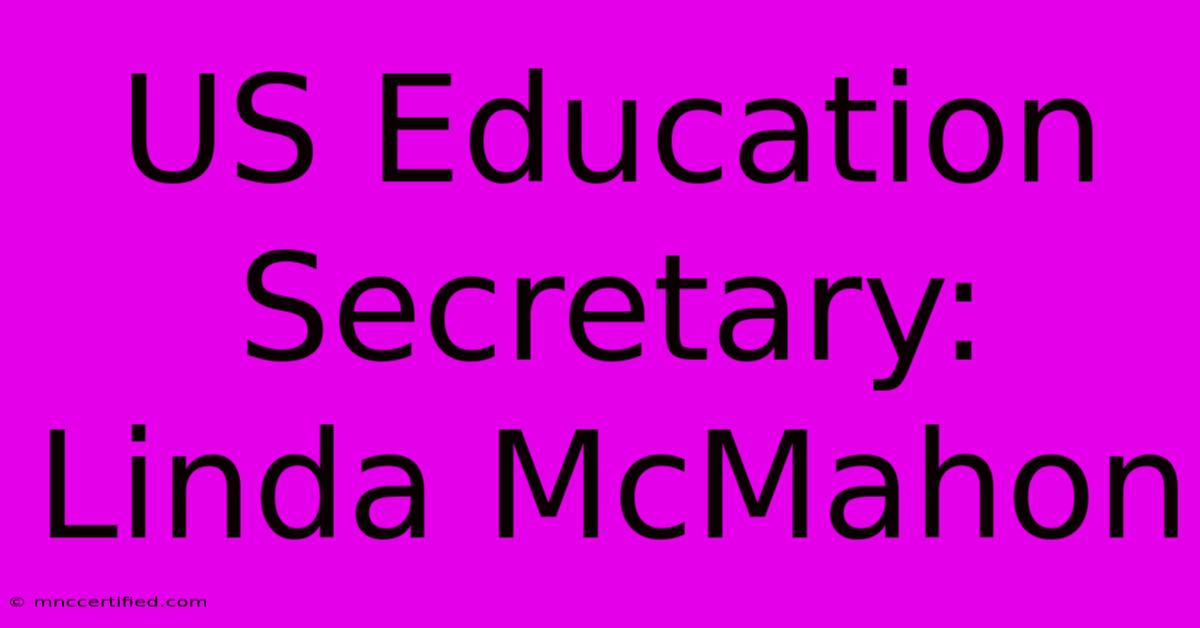US Education Secretary: Linda McMahon

Table of Contents
Linda McMahon: A Deep Dive into the Tenure of the Former US Education Secretary
Linda McMahon's time as a prominent figure in the world of professional wrestling transitioned unexpectedly into a significant role in US politics. Her appointment as Administrator of the Small Business Administration (SBA) under President Trump, followed by her brief but impactful tenure as the Deputy Administrator of the SBA, provided a unique backdrop to her career. While she never officially served as the US Secretary of Education, understanding her background and political appointments sheds light on the broader landscape of US government appointments and the influence of business leaders in public service. This article delves into Linda McMahon's career, focusing on her SBA roles and their relevance to the education sector.
From Wrestling to Washington: Linda McMahon's Unconventional Path
Linda McMahon's journey is far from typical. Co-founding World Wrestling Entertainment (WWE) with her husband, Vince McMahon, she built a global entertainment empire. This experience instilled in her a strong understanding of business management, marketing, and strategic planning – skills that proved invaluable in her later political career.
The SBA Years: Impact Beyond Wrestling
Appointed as the Administrator of the SBA in 2017, McMahon focused on streamlining the agency's processes to better support small businesses. Her emphasis on reducing regulatory burdens and fostering entrepreneurship resonated with the Trump administration's pro-business agenda. Her experience in building a successful company from the ground up lent credibility to her efforts to support other aspiring entrepreneurs.
Key Initiatives during her SBA Tenure:
- Cutting Red Tape: McMahon championed efforts to simplify loan application processes and reduce bureaucratic hurdles faced by small business owners.
- Promoting Women-Owned Businesses: Recognizing the significant contributions of women entrepreneurs, she actively promoted initiatives to support their growth and success.
- Focus on Rural Development: McMahon worked to ensure that small businesses in rural communities had access to the resources and support they needed to thrive.
While not directly related to education, McMahon's focus on entrepreneurship has significant indirect implications for the education sector. Supporting small businesses often means supporting the training and employment of individuals, contributing to a stronger economy and a more robust workforce – a foundation for a thriving education system.
The Missing Piece: Linda McMahon and the Department of Education
It's crucial to clarify that Linda McMahon never held the position of US Secretary of Education. This distinction is important to avoid misinformation. While her background in business and her experience within the Trump administration might have seemed to align with potential roles within the education department, focusing on workforce development and economic growth, her focus remained primarily on the SBA. Understanding this distinction is crucial for accurate reporting and avoids spreading inaccurate information online.
The Broader Context: Business Leaders in Government
McMahon's appointment, along with other appointments of business leaders to government positions, highlights a trend of utilizing private sector expertise within the public sector. The intention is often to leverage their experience and management skills to improve efficiency and effectiveness. However, this approach also invites debate and scrutiny regarding the potential conflicts of interest and the differing priorities between the private and public spheres.
Conclusion: A Legacy of Entrepreneurship and Public Service
Linda McMahon's career trajectory is a testament to the unconventional paths individuals can take to influence public policy. Although she did not serve as the US Secretary of Education, her time as Administrator of the SBA demonstrates the intersection of business acumen and public service. Her focus on supporting entrepreneurship, indirectly benefiting the educational landscape by fostering job creation and economic growth, remains a significant aspect of her legacy. Further research into the impact of her policies on small business growth could provide a more detailed understanding of her contribution to the broader economic and social fabric of the United States.

Thank you for visiting our website wich cover about US Education Secretary: Linda McMahon. We hope the information provided has been useful to you. Feel free to contact us if you have any questions or need further assistance. See you next time and dont miss to bookmark.
Featured Posts
-
Jailbreak Trading Value List 2023
Nov 20, 2024
-
Andorra Citizenship By Investment
Nov 20, 2024
-
Afristrat Investment Holdings Ltd
Nov 20, 2024
-
Two Bears Trading Post Ruidoso Nm
Nov 20, 2024
-
Investment Management Jobs London
Nov 20, 2024